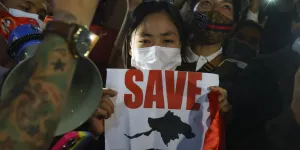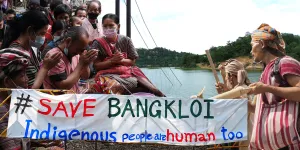By New Naratif, Prachatai, and VOD |
<p> A year after Wanchalearm Satsaksit vanished, authorities say there is no proof he was abducted in Phnom Penh. A joint investigation reveals details of the Thai dissident’s escape from Thailand, life in exile in Cambodia and the last days before he disappeared.</p>
By Supalak Ganjanakhundee |
<p>In order to eradicate all forms of dictatorship and restore democracy in military-ruled Myanmar, the newly formed National Unity Government (NUG) has called for urgent international recognition and an end to violence before political dialogue.</p>
By Yiamyut Sutthichaya |
<p>“The rich get infected, the poor be damned” describes the ongoing Covid-19 outbreak in Thailand, especially now that the disease, starting from the VVIP guests at luxury night clubs, has reached densely-populated communities in Bangkok.</p>
By Prachatai |
<p>Ong Dam Warriors may claim to be peaceful, but one cannot forget too easily. The group has a long history in right-wing pro-monarchy campaigns that have included threats, assaults, and even death.</p>
By Yiamyut Sutthichaya, Sorawut Wongsaranon |
<p>The Cabinet has approved a major amendment to the 24-year-old Official Information Act. While some flaws have been fixed, there is a new, huge loophole that allows the authorities more excuse not to disclose information to the public and even criminalizes disclosure.</p>
By Prachatai |
<p>A story of Patiwat Saraiyaem, or “Mor Lam Bank”, a prominent young traditional mor lam singer whom his political expressions cost himself freedom and misfortunes as the state see them as illegal.</p>
By Prachatai political editorial team |
<p>In an era of political tension and ideological conflict, Thai society has reached a turning point. While the military government has paved its way to maintaining power, a new pro-democracy movement is trying to put rights and power back into the hands of the people.</p>
By Sorawut Wongsaranon |
<p>10 years after the crackdowns on the Red Shirt protests in 2010, we look back at the progress of the investigation into the death of 94 people, other avenues of seeking justice, and whether transitional justice is possible.</p>
By The Isaander; Weerawat Somnuk, Smanachan Buddhajak, Donlawat Sunsuk, and Somchai Saefad |
<p>The aridity of the Thung Kula Ronghai region’s alkaline soil is behind the Hom Mali rice strain’s popularity as a world-renowned export. The rice farmers and the special care they put into their production method have succeeded in turning their despair at the unpredictability of the rain cycle into assets. While quite a number of Isaan (northeastern Thai) people prefer sticky rice to regular rice for everyday consumption, the jasmine or ‘Hom Mali 105’ variety has been grown in Isaan for 70 years. How did the popularity of this particular rice variety come about?</p>
By The Glocal; Nuttakorn Vititanon, Kunnawut Boonreak and Wittayakorn Boonruang |
<p>Two myths created by the media caused misunderstandings. One is that Chiang Mai faced the most severe problem, and the second is that this problem is likely to increase in severity every year. Statistics over the past 24 years indicate otherwise.</p>
By Yostorn Triyos, Realframe |
<p>In news reports less than 10 years ago, the new problem of PM2.5 dust was added to news items in the Thai media of forest fires and the problem of haze caused by forest fires and crop burning. This has led to a clear concrete policy shift, since it has a direct impact on the lives of the middle class in the country’s large cities, especially major centres like Bangkok and tourist spots like Chiang Mai Province. With an unidentifiable origin, smog, forest fires and PM2.5 have by implication become the same thing.</p>
By Anna Lawattanatrakul |
<p>After being forcibly evacuated from their ancestral homeland in the Kaeng Krachan forest twice, the Bang Kloi indigenous Karen community has been facing community rights issues, which remain unresolved. The community is now at risk of another forced evacuation, while Thailand still has no legislation protecting indigenous rights.</p>












